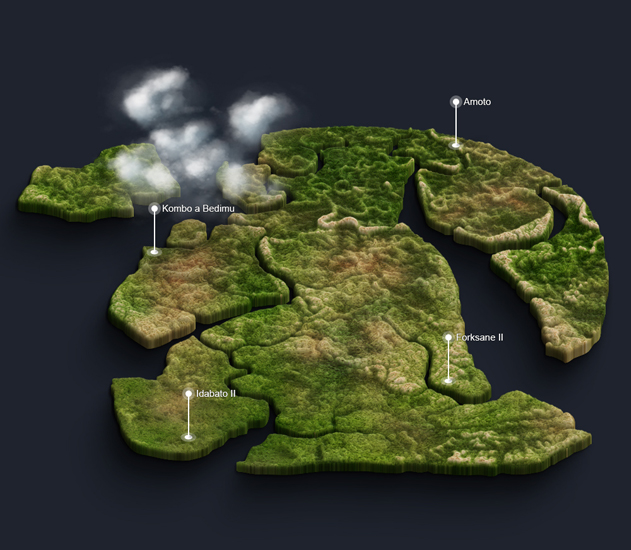
BAKASSI
The population of Bakassi is in the middle of a historic resettlement. Following a protracted border conflict dispute between Cameroon and Nigeria, both governments began a handing-over of the peninsula to Cameroon in 2006.
Until then, the settlers of Bakassi were part of the larger Efik and Oron ethnic groups of Nigeria and have no cultural affinity with any ethnic group in Ambazonia.To repopulate Bakassi, a Bakassi Peninsula Development Program (BADEP) was launched which will help populate the eponymous territory once claimed by Nigeria.
Involving the development of infrastructure projects, the BADEP, which will be financed by public funds and development partners, aims at facilitating access, both by land and sea, to this Cameroonian territory.
Located in the South Western region, the Bakassi Peninsula is mostly inhabitated by Nigerians. However, the government of Cameroon initiated there a programme to establish palm oil farms owned by State-run agro-industrial firm, Pamol Plantations Plc.
LOCAL GOVERNMENT
Bakassi has four(4) municipal council units: Kombo-Abedimo, Idabato, Isangele and Kombo-Itindi. After Fako, it is the 2nd most populous county in the State.
There are District Hospitals in Isangele and Idabato, while there are also Government Integrated Health Centres in place such as Kombo Itindi. Most buildings to host the different administrations are in place with the specificity that houses to lodge civil servants have also been constructed in Akwa. Other key development endeavors are reportedly noticeable in the health sector.
Before the 2006 transfer, The Bakassi Welfare Union's had a longstanding monopoly of Bakassi politics and economy.
Bakassi returned to full Ambazonia control on 14 August 2013. It is located in Ambazonia’s Equatorial State.
RESOURCES
As a fertile fishing ground, the Bakassi Peninsula has often been compared to Newfoundland in North America and Scandinavia in Europe. In terms of its extensive reserves of oil and gas, the Bakassi Peninsula is potentially the richest Peninsula in Africa. The coast of the Bakassi Peninsula is estimated to hold oil deposits of billions of barrels. Besides oil, the Peninsula itself is believed to contain several trillion cubic feet of natural gas beds, potentially more profitable than the reserves of crude oil .
The location of the Peninsula is also very strategic. Its positioning in the extreme eastern end of the Gulf of Guinea makes it a potentially effective base for defensive and offensive military operations. The region is also a pathway and indeed, harbours two important seaports- Douala in Cameroon and Calabar in Nigeria. Described as ‘a strategic underbelly of Nigeria,’ the struggle for the control of the Peninsula should therefore be viewed as one for the control and appropriation of its natural resources and strategic values.
ECONOMY
Bakassi is essentially a fishing zone and reports say government has besides other projects, constructed 50-houses Fish Village in Isangele.
In 2008, the Mission for the Development of Traditional offshore and inshore fishing (Mission de Développement de la Pêche Artisanale Maritime- MIDEPECAM) launched a project to promote shrimps from Bakassi peninsula (popularly called Gambas). Apart from this project which could create a shrimp sector, MIDEPECAM sought to finalize the construction of an ice production unit in Idenau in the Southwest in 2018. This infrastructure would boost the conservation of fish products.
Although the Mundemba-Isangele-Akwa road is under rehabilitation by the Military Engineering Corps, the bad state of the Ekondo-Titi-Mundemba road, coupled with persistent rainfall in the area, is not helping matters. Like one man, the people have been crying for consistent and permanent maintenance, if not, the tarring of the Loum-Kumba-Mundemba-Akwa road to link the peninsula to the rest of the country.

